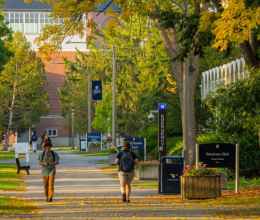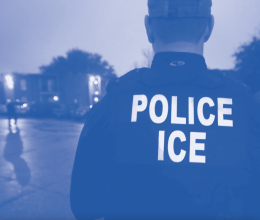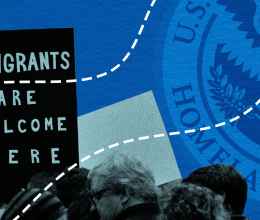AUGUSTA—Faith leaders, advocates for immigrants, victims of violence, and those living in poverty, joined asylum seekers and other immigrants to express concerns over a new rule from Maine Department of Health and Human Services (DHHS) concerning the law passed by the Legislature in 2015 protecting General Assistance for asylum seekers and other immigrants.
The DHHS rule is for the implementation of Public Law 2015, Chapter 324 (PL324). PL324 passed with strong bipartisan support with the intent to ensure all immigrants who are lawfully present or seeking a lawful status would maintain eligibility for General Assistance for a limited period of time so they can put food on the table and a roof over the heads of their families. The Legislature recognized that taking away people’s only form of financial support while they are navigating a complicated federal immigration process would have devastating and unacceptable consequences for these individuals, their families, Maine communities, and our state.
However, the DHHS rule clearly violates the law by excluding groups of people who are lawfully present in the United States or who are lawfully pursuing immigration relief. Some of the immigrants who could not receive General Assistance under the new rule include:
- Some victims of domestic violence who need safety and protection so they can leave their abusers and apply for residency under the Violence Against Women Act;
- Certain survivors of torture granted relief under the Convention Against Torture;
- Some unaccompanied minors who have been abused, neglected, or abandoned by their parents;
- Many asylum seekers.
There are many different paths to apply for a lawful status in the United States. Barring some immigrants who are pursuing a lawful process to apply for immigration relief from receiving assistance is contrary to the intent of lawmakers.
This new rule also puts municipalities in a bind. Under GA law, municipalities have the authority to define the scope of eligibility in accordance with state law. Portland and Lewiston passed definitions in ordinance that comply with the new state law that do not exclude immigrants who the law was intended to protect. However, their definitions disagree with the proposed DHHS rule and any city or town that doesn’t follow the rule risks being denied reimbursement for GA. On the other hand, if a city or town follows the rule, they may unlawfully deny assistance to people, and therefore break the law. The new law was meant to eliminate confusion between the state and municipalities; instead, it forces municipalities to choose between breaking the law and potentially being denied reimbursement by the state. This is unacceptable.
The following quotes may be used in your reporting:
Sue Roche, Executive Director of Immigrant Legal Advocacy Project:
The new law was created specifically to protect vulnerable people who the proposed rule leaves out, including asylum seekers who have fled violence and persecution in their home countries who are working with their lawyers to prepare their asylum applications. These applications are not simple, and it will often take our pro bono attorneys over 100 hours to compile the country condition documentation, expert testimony, and supporting documentation needed for a successful asylum case. We will not be able to recruit new pro bono lawyers if their clients are anxious to file their applications quickly in order to retain general assistance benefits. Many other vulnerable groups will be left out, including asylum seekers who have filed asylum applications with an immigration judge and must wait years for a decision, some domestic violence victims and unaccompanied minors, and people granted protection under the Convention Against Torture.
Rabbi Erica Asch:
Last month, Jews recalled our journey from slavery to freedom as part of our celebration of Passover. This story of liberation is a universal story. This season calls upon us to remember that we know the feeling of being an outsider, a stranger. The commandment to treat the stranger well is the most often repeated in the five books of Moses. We read, "The stranger who resides with you shall be to you as the native among you, and you shall love him as yourself (Leviticus 19:34). Our scripture and our humanity calls upon us to welcome new Mainers to this state.
These immigrants have escaped hardship and seek to build a new life here. We are enriched by their presence. Our cities and community are stronger because they are here. We are called upon to not only provide them with shelter and food, but to welcome them as well.
Sonia Irambona, an immigrant from Burundi who leads the New Mainers Tenants' Association:
When I first came to Maine from Burundi, I needed the help of General Assistance to survive because I had to wait 8 months to receive my work permit. Thanks to the help Maine gave me, I was able to make a new life here and now I am committed to giving back to my community. Many of the people who need help today are like me. We came here fleeing terrible violence and persecution. We want to have safe lives. We want to work. We want to go to school. We want to feed our families and make sure they have a place to live. We're just like other Mainers looking to sustain our lives and contribute to the community. GA helps us get on our feet more quickly so that we can be a part of Maine's future.
When I first came to Maine from Burundi, I needed the help of General Assistance to survive because I had to wait 8 months to receive my work permit. Thanks to the help Maine gave me, I was able to make a new life here and now I am committed to giving back to my community. Many of the people who need help today are like me. We came here fleeing terrible violence and persecution. We want to have safe lives. We want to work. We want to go to school. We want to feed our families and make sure they have a place to live. We're just like other Mainers looking to sustain our lives and contribute to the community. GA helps us get on our feet more quickly so that we can be a part of Maine's future.
Joby Thoyalil, Policy Analyst at Maine Equal Justice Partners
The department’s new rule clearly violates the state law that passed last June. It leaves out many asylum seekers and other groups of new Mainers who would lose their homes and ability to feed their families. These are the very people that the new law was intended to protect.
Oamshri Amarasingham, Advocacy Director, ACLU of Maine
After listening to hours of testimony from immigrants, advocates, and faith and business leaders, the Legislature acted to do what was best for Maine – to restore access to General Assistance. The Department's effort to narrow that access goes against the spirit and the letter of the law, not to mention the will of Maine people.
Alain Nahimana, Coordinator, Maine Immigrants’ Rights Coalition
Maine is a safe, beautiful place to call home. And Maine is strengthened by the diversity, new population, new ideas, and experiences of the immigrants who are making their homes here. We cannot afford to be seen as an unwelcoming state for immigrants—it will be damaging to our economy for decades to come. Providing assistance for all asylum seekers and other immigrants is an investment today that will pay dividends into Maine’s future.







